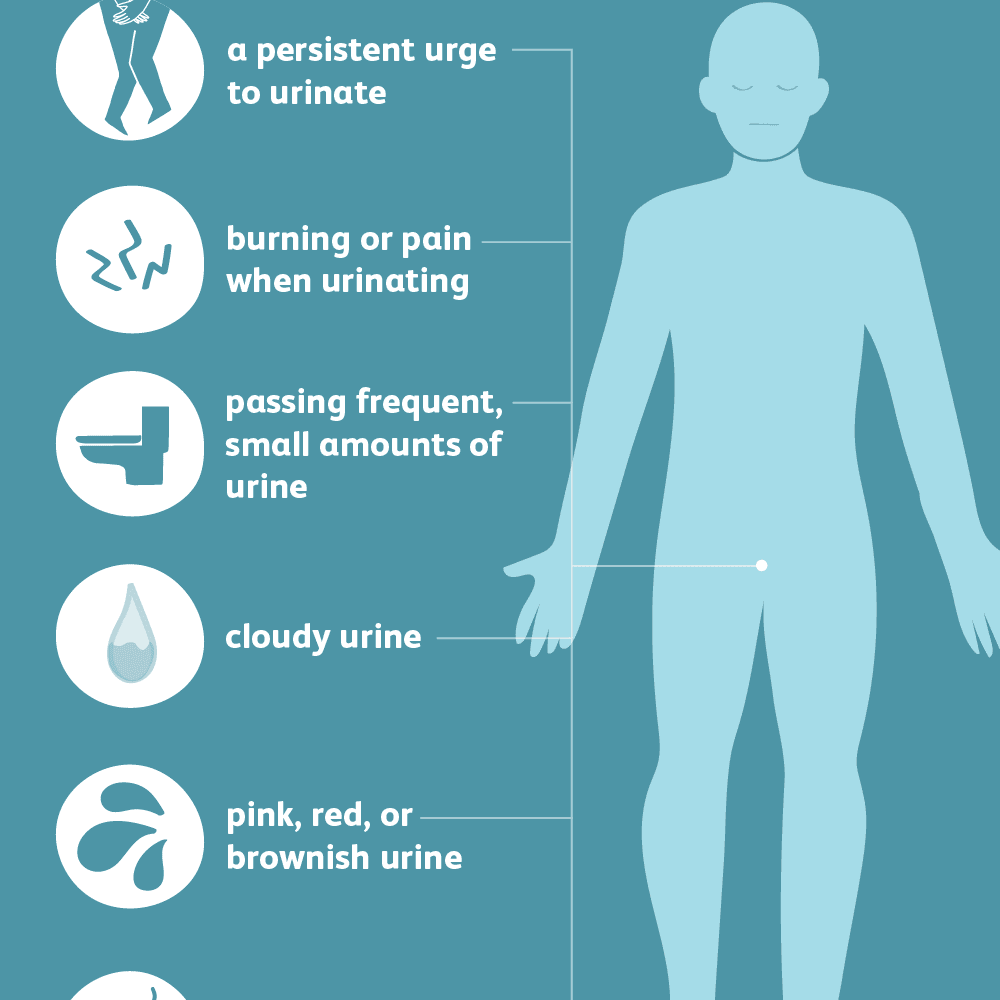Urinary Tract Infection Symptoms And Signs
Symptoms of a urinary tract infection are similar in men, women, and children.
- Early symptoms and signs are usually easy to recognize and primarily involve pain, discomfort, or burning when trying to urinate.
- Accompanying this can be the sense that one needs to urinate urgently or the need for frequent urination . Even when there is a strong urge to urinate, you may pass only a small amount of urine.
- The urine itself may appear bloody or cloudy. Men may feel pain in the rectum, while women may experience pain around the pubic bone.
UTI symptoms can be uncomfortable or painful. They include the following:
- A strong urge to urinate
- Pain or burning during urination
- Passing small amounts of urine
- Cloudy, strong-smelling, red or pink urine
- Mucus or discharge
- Fever, shaking, chills, or pain in the upper back, side, or groin
E. coli
When To See A Professional
If you are experiencing the early signs of a UTI, see a doctor as soon as possible. Putting off a visit to the doctor if you have symptoms of a UTI will not only prolong your discomfort, but could also lead to complications. If detected early, a UTI is usually easy to treat and has no lasting effect on your urinary tract. However, if left untreated, a UTI can also affect your bladder and kidneys.
To help rid yourself of a painful UTI, contact the Urology Specialists of the Carolinas today for an appointment. A simple examination and urine or blood test could save you a lot of trouble in the long run. With a proper diagnosis and treatment plan, you will be on the road to recovery in no time.
In addition to seeing a professional, your nutrition and lifestyle play a huge role in a happy and healthy urinary tract system. Download our Nutrition and Lifestyle Guide to learn our top tips and tricks for maintaining and achieving optimal urology health.
This content was originally published in February 2015 and was refreshed in December 2020.
How Is A Urinary Tract Infection Diagnosed
According to the Mayo Clinic, UTIs are typically diagnosed by analyzing a urine sample for the presence of white blood cells, red blood cells or bacteria. Sometimes, a lab will grow a sample from the urinary tract to determine what bacteria they are dealing with and which medication will be most effective. People who experience frequent UTIs or have what the doctor suspects to be an abnormal urinary tract may have a CT scan or an MRI prescribed to allow for a more thorough diagnosis. A doctor may also perform a cystoscopy, a procedure that involves sending a long, thin tube connected to a tiny camera up the urethra and into the bladder.
You May Like: What Treatment Options Are Available For Urinary Incontinence
Recommended Reading: Where To Buy Royal Canin Urinary So
Eating Diet & Nutrition
Experts dont think eating, diet, and nutrition play a role in preventing or treating bladder infections. If you have any type of UTI, talk with a health care professional about how much to drink each day to help prevent or relieve your infection.
The National Institute of Diabetes and Digestive and Kidney Diseases and other components of the National Institutes of Health conduct and support research into many diseases and conditions.
What Is A Urinary Tract Infection

UTIs are common infections that happen when bacteria, often from the skin or rectum, enter the urethra, and infect the urinary tract. The infections can affect several parts of the urinary tract, but the most common type is a bladder infection .
Kidney infection is another type of UTI. Theyre less common, but more serious than bladder infections.
You May Like: Does Cvs Minute Clinic Do Urinary Tract Infections
Signs Of A Urinary Tract Infection
A urinary tract infection is something many women and some men have had to deal with at some point in their lives. It happens when bacteria from outside your urinary tract enter it, usually through your urethra.
The infection itself can manifest anywhere in your urinary system, including your urethra, bladder, ureters, or even your kidneys. The higher up the infection, the more severe it can become. Fortunately, most UTIs are milder and affect the lower parts of your urinary tract such as your urethra and bladder.
Our Westmed Family Healthcare experts Clifton Etienne, MD, Michael Cavanagh, MD, and Flora Brewington, MD, often see people with urinary tract infections. At our office in Westminster, Colorado, a same-day urgent care visit can result in an accurate UTI diagnosis in addition to tips and medications to alleviate your UTI and its symptoms.
Familiarizing yourself with five of the most glaring signs of a UTI can help you identify it early and treat it before it migrates to your kidneys.
Will A Uti Go Away On Its Own
Some UTIs can go away on their own. A 2022 article states that some uncomplicated UTIs can resolve spontaneously without treatment, but that some people need to see a doctor to relieve their symptoms.
A person should always see a doctor if they develop symptoms of a UTI as they can progress into a kidney infection.
Also Check: Where Should The Urinary Drainage Bag Be Kept
A Pharmacist Can Help With Utis
You can ask a pharmacist about treatments for a UTI.
A pharmacist can:
- offer advice on things that can help you get better
- suggest the best painkiller to take
- tell you if you need to see a GP about your symptoms
Some pharmacies offer a UTI management service. They may be able to give antibiotics if they’re needed.
Why Do Women Get Urinary Tract Infections More Often Than Men
Women tend to get urinary tract infections more often than men because bacteria can reach the bladder more easily in women. The urethra is shorter in women than in men, so bacteria have a shorter distance to travel.
The urethra is located near the rectum in women. Bacteria from the rectum can easily travel up the urethra and cause infections. Bacteria from the rectum is more likely to get into the urethra if you wipe from back to front after a bowel movement. Be sure to teach children how to wipe correctly.
Having sex may also cause urinary tract infections in women because bacteria can be pushed into the urethra. Using a diaphragm can lead to infections because diaphragms push against the urethra and make it harder to completely empty your bladder. The urine that stays in the bladder is more likely to grow bacteria and cause infections.
Don’t Miss: Vitamins For Healthy Urinary Tract
Its Easy To Get The Care You Need
See a Premier Physician Network provider near you.
If you feel burning when you urinate, you may quickly recognize the problem as a urinary tract infection, or UTI. But when youre older, a UTI can be more difficult to diagnose. It may even cause confusion and other symptoms of dementia. At the same time, an older adult with Alzheimers disease or dementia may miss the signs of infection, or be unable to tell you about them.
UTIs are a common bladder condition, usually caused by bacteria. They occur more often in women, and become more frequent as we age. Most infections are not serious and can be cured quickly. But some UTIs can lead to severe, even life-threatening, problems, making it critical to catch them early.
If an older adult is disoriented for no clear reason, ask a health care provider to test for a UTI.
Also Check: I Have A Urinary Tract Infection And Im Bleeding
What Is The Prognosis For A Person With A Urinary Tract Infection
Urinary tract infections typically respond very well to treatment. A UTI can be uncomfortable before you start treatment, but once your healthcare provider identifies the type of bacteria and prescribes the right antibiotic medication, your symptoms should improve quickly. Its important to keep taking your medication for the entire amount of time your healthcare provider prescribed. If you have frequent UTIs or if your symptoms arent improving, your provider may test to see if its an antibiotic-resistant infection. These are more complicated infections to treat and may require intravenous antibiotics or alternative treatments.
Read Also: Are Probiotics Good For Urinary Tract
Antibiotics For A Uti
The form of antibiotic used to treat a bacterial UTI usually depends on which part of the tract is involved.
Lower tract UTIs can usually be treated with oral antibiotics. Upper tract UTIs require intravenous antibiotics. These antibiotics are put directly into your veins.
Sometimes, bacteria develop resistance to antibiotics. To reduce your risk of antibiotic resistance, your doctor will likely put you on the shortest treatment course possible. Treatment typically lasts no more than 1 week.
Results from your urine culture can help your doctor select an antibiotic treatment that will work best against the type of bacteria thats causing your infection.
Treatments other than antibiotics for bacterial UTIs are being examined. At some point, UTI treatment without antibiotics may be an option for bacterial UTIs by using cell chemistry to change the interaction between the body and the bacteria.
There are no home remedies that can cure a UTI, but there are some things that you can do that can help your medication work better.
These home remedies for UTIs, like drinking more water, may help your body clear the infection faster.
Changes In Your Urine

If your urine doesnt seem totally normal, it could be a warning that youre living with a UTI. Common urine changes include:
- A pink or red tinge in your urine
That last sign means a small amount of blood has worked its way into your urine. That can seem particularly alarming, but its a relatively common side effect of a UTI.
Also Check: O Shot For Urinary Incontinence
Burning Or Painful Urination
People with UTI often feel a burning sensation when they urinate. This symptom is one of the key signs that a person may have a urinary tract infection.
Burning urination or painful urination is medically known as dysuria. It can be caused by infectious and noninfectious conditions.
A urinary tract infection makes the lining of the bladder and urethra become red and irritated.
In addition to the burning sensation, there is also an itchy or stinging feeling as the urine comes out. The pain can be felt at the start of urination or after urination.
Pain is often felt in the urethra. These are the tubes that carry urine to the bladder. The pain can also extend to the area around the genitals.
Treatment For More Severe Utis
Kids with a more severe infection may need treatment in a hospital so they can get antibiotics by injection or IV .
This might happen if:
- the child has high fever or looks very ill, or a kidney infection is likely
- the child is younger than 6 months old
- bacteria from the infected urinary tract may have spread to the blood
- the child is dehydrated or is vomiting and cannot take any fluids or medicine by mouth
Kids with VUR will be watched closely by the doctor. VUR might be treated with medicines or, less commonly, surgery. Most kids outgrow mild forms of VUR, but some can develop kidney damage or kidney failure later in life.
Recommended Reading: What Causes A Man To Have A Urinary Tract Infection
What Is The Urinary Tract
The urinary tract makes and stores urine, one of the body’s liquid waste products. The urinary tract includes the following parts:
- Kidneys: These small organs are located on back of your body, just above the hips. They are the filters of your body removing waste and water from your blood. This waste becomes urine.
- Ureters: The ureters are thin tubes that carry urine from the kidneys to your bladder.
- Bladder: A sac-like container, the bladder stores your urine before it leaves the body.
- Urethra: This tube carries the urine from your bladder to the outside of the body.
How Is A Uti Diagnosed
Your healthcare provider will ask about your signs and symptoms. Your provider may press on your abdomen, sides, and back to check if you feel pain. You may need any of the following:
- Urinalysis will show infection and your overall health.
- Urine cultures may show which germ is causing your infection.
Recommended Reading: Best Pads For Male Urinary Incontinence
Condom Use During Sex
Non-lubricated latex condoms may increase friction and irritate the skin during sexual intercourse. This may increase the risk of a UTI.
But there are many reasons to use condoms. Theyre important for reducing the spread of sexually transmitted infections and preventing unwanted pregnancy.
To help prevent friction and skin irritation from condoms, be sure to use enough water-based lubricant during sex.
Avoid using condoms coated with spermicide.
Can I Become Immune To The Antibiotics Used To Treat A Uti
Your body can actually get used to the antibiotics typically used to treat a urinary tract infection . This happens in people who have very frequent infections. With each UTI and use of antibiotics to treat it, the infection adapts and becomes harder to fight. This is called an antibiotic-resistant infection. Because of this, your healthcare provider may suggest alternative treatments if you have frequent UTIs. These could include:
- Waiting: Your provider may suggest that you watch your symptoms and wait. During this time, you may be encouraged to drink plenty of fluids in an effort to flush out your system.
- Intravenous treatment: In some very complicated cases, where the UTI is resistant to antibiotics or the infection has moved to your kidneys, you may need to be treated in the hospital. The medicine will be given to you directly in your vein . Once youre home, you will be prescribed antibiotics for a period of time to fully get rid of the infection.
Recommended Reading: Food For Urinary Tract Infection
A Burning Sensation When You Urinate
That burning feeling serves as a telltale red flag. One of the most common symptoms of a UTI, an unwelcome burning as you urinate often indicates that you have an infection in some part of your urinary system.
While the actual infection most commonly occurs in your urethra and your bladder, it can also affect your kidneys, ureters, and more. Ultimately, the infection rears its ugly head when you expel urine, causing a burning or stinging sensation.
Most Common Signs Of Urinary Tract Infection

- In Blog, Oxford, Oxford, FL
Urinary tract infections are infections of any part of the urinary system, such as kidneys, bladder, ureters and urethra. UTIs typically occur when bacteria access the urinary tract via the urethra and start to multiply in the bladder. While the urinary system is equipped to keep out the bacteria, the systems defenses may sometimes fail and allow bacteria to take hold and multiply, resulting in a full-blown urinary tract infection. Abnormalities in the urinary tract that interfere with drainage of urine , foreign bodies in the bladder , diabetes, and immune-suppressing drugs and disorders increase the risk of urinary tract infections.
How common are urinary tract infections?
5 most common signs of urinary tract infection
Urinary tract infections are easy to treat when detected early, but untreated or undiagnosed UTI may lead to kidney damage. To help detect UTIs and seek early treatment, it is important to familiarize yourself with their most common signs.
Often, the most frequent sign of a urinary tract infection is a noticeable change in urination, such as frequent urination, burning sensation when passing urine or strong-smelling urine.
The most common signs of a UTI include:
Also Check: Urinary Tract Infection Go Away
Recovery And Management Of Utis In Cats
Most cats will fully recover within 7-10 days of developing a urinary tract infection, but they may need to remain on a canned diet for longer. Your vet may check a urine sample after treatment to determine if all the bacteria are gone.
Occasionally, cats will develop repeated urinary tract infections. Cats with recurring UTIs often require more testing to determine the underlying cause.
Tips To Prevent A Urinary Tract Infection
Topics in this Post
A urinary tract infection, also called a UTI, is an infection that occurs in the urinary system. This could include the urethra, bladder, ureters and kidneys. Most infections involve the bladder and urethra, known as the lower urinary tract.
The most common symptoms include painful urination, tenderness above the bladder area, urgency and frequency of urination. Cloudy and a strong odor are not signs of infection.
Women are at greater risk for a UTI because the urethra is shorter than in men, so it’s easier for bacteria to travel to the bladder. UTIs also are more common in postmenopausal women because low estrogen levels change vaginal and urethral tissue to increase the risk of infection.
It’s always better to prevent an infection rather than simply treat it. UTIs are no different.
Also Check: What Is Urinary Tract Malignancy
Treatment Of Utis In Dogs
Treatment for bacterial UTIs requires antibiotics. Generally, broad-spectrum antibiotics are used as they can affect a wide range of bacteria. However, if they are not successful, an antibiotic for the specific bacteria needs to be assessed and administered. These must always be prescribed by a veterinarian. It is vital that a course of antibiotics is completed in full, even if symptoms seem to have abated.